
Pacific-Basin Finance Journal
Scope & Guideline
Unveiling Insights into the Pacific’s Economic Landscape
Introduction
Aims and Scopes
- Corporate Finance and Governance:
The journal publishes studies that explore various aspects of corporate finance, including capital structure, mergers and acquisitions, corporate governance, and the role of institutional investors. Research often emphasizes the impact of ownership structures and board diversity on firm performance. - Market Behavior and Asset Pricing:
Papers in this area investigate the dynamics of financial markets, including stock price movements, investor behavior, and the implications of market anomalies. The journal features research on risk management, asset pricing models, and the effects of behavioral biases in investment decisions. - Sustainable Finance and ESG Factors:
The journal has a growing focus on environmental, social, and governance (ESG) factors in finance. This includes research on the impact of ESG practices on firm performance, investor sentiment, and the integration of sustainability into financial decision-making. - Financial Technology and Innovation:
Research exploring the impact of fintech innovations on traditional financial systems, including digital finance, blockchain, and the role of technology in enhancing financial inclusion and efficiency. - Macroeconomic Influences on Finance:
The journal addresses the macroeconomic factors affecting finance, such as economic policy uncertainty, monetary policy, and global financial stability, particularly in the context of emerging markets. - Cross-Border Investments and Global Markets:
A significant portion of the research focuses on cross-border investments, including the implications of globalization for financial markets, and the effects of geopolitical risks on investment behavior.
Trending and Emerging
- Impact of Digitalization on Financial Practices:
Research exploring how digital finance and technology influence traditional financial practices is on the rise. Topics include the effects of fintech on banking, investment behaviors, and the integration of AI in financial decision-making. - Behavioral Finance and Investor Psychology:
There is an increasing focus on understanding the psychological factors influencing investor behavior, including sentiment analysis and the impact of social media on market dynamics. - Sustainability and Green Finance:
The importance of sustainable investing and green finance is gaining traction, with research examining the financial performance of sustainable firms and the impact of ESG factors on investment strategies. - Data Analytics and Machine Learning in Finance:
The application of machine learning and big data analytics in finance is expanding. Researchers are exploring new methodologies for predicting asset prices, assessing risk, and improving investment strategies. - Global Economic Policy Uncertainty:
Emerging studies are increasingly addressing the implications of global economic policy uncertainty on financial markets, corporate behavior, and investment strategies, particularly in the context of recent geopolitical events.
Declining or Waning
- Traditional Banking and Conventional Finance:
Studies focusing solely on traditional banking practices and conventional finance mechanisms are becoming less frequent, as the journal shifts towards more innovative topics such as fintech and digital transformation. - Static Risk Models:
Research employing static models for assessing financial risk has seen a decline, with a preference for dynamic and machine learning-based approaches that better capture market complexities. - Regional Focus without Comparative Analysis:
Papers that solely focus on specific regions without comparative or cross-regional analysis have decreased, as the journal increasingly values broad contextual insights that include comparisons across different markets. - Purely Theoretical Contributions:
While theoretical frameworks remain important, there is a noticeable decline in purely theoretical papers without empirical validation, as the journal emphasizes empirical evidence and real-world applicability.
Similar Journals
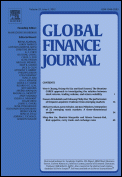
Global Finance Journal
Elevating discourse in finance and economics.Global Finance Journal is an esteemed periodical published by Elsevier, dedicated to the dynamic fields of finance and economics. With an impressive history spanning from 1989 to 2024, this journal holds a significant position in the academic community, boasting a Q1 quartile ranking in both Economics and Econometrics, as well as Finance, as of 2023. It is highly regarded in Scopus rankings, placing 40th out of 317 in Finance and 99th out of 716 in Economics and Econometrics, demonstrating its influence and reach among researchers and practitioners alike. Although not an open-access journal, the Global Finance Journal provides rigorous peer-reviewed articles that explore critical issues, advance theoretical frameworks, and address practical applications in global finance. As such, it serves as a vital resource for researchers, financial professionals, and students aiming to deepen their understanding of economic phenomena and contribute to the ongoing discourse in these vibrant disciplines.
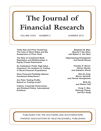
JOURNAL OF FINANCIAL RESEARCH
Unveiling Trends in Financial ResearchThe JOURNAL OF FINANCIAL RESEARCH, published by WILEY, stands as a pivotal platform for disseminating innovative research in the fields of finance and accounting since its inception in 1978. With an ISSN of 0270-2592 and an E-ISSN of 1475-6803, this journal aims to address contemporary challenges and trends within the financial research landscape. It has achieved notable recognition, being placed in the Q2 category for both Finance and Accounting in the 2023 rankings, signifying its relevance and impact within the academic community. Although it does not currently offer open access, the journal is accessible through various academic databases, catering to a diverse audience of researchers, professionals, and students keen on advancing their knowledge and understanding of financial systems and methodologies. With an evolving scope that encompasses empirical studies, theoretical frameworks, and practical applications, the JOURNAL OF FINANCIAL RESEARCH is committed to contributing valuable insights into the complexities of financial practices and policies.
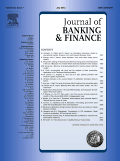
JOURNAL OF BANKING & FINANCE
Your Gateway to Cutting-Edge Financial ResearchWelcome to the Journal of Banking & Finance, a premier publication in the fields of finance and economics, expertly published by Elsevier. With its esteemed Q1 ranking in both the Economics and Econometrics and Finance categories for 2023, this journal frequently garners significant attention from researchers, professionals, and academics alike. Established in 1977, it has become a crucial resource for the latest research and advancements in banking and financial services, influencing policies and practices on a global scale. The journal's commitment to high-quality, peer-reviewed content ensures that it not only contributes to academic discourse but also drives real-world financial innovation. As part of the respected Elsevier publishing collection, the journal's rigorous standards and comprehensive analysis serve as indispensable tools for those seeking to understand and navigate the complexities of the financial landscape. Located in the Netherlands, the Journal of Banking & Finance continues to play a vital role in shaping the future of financial research through its impactful insights and research contributions.
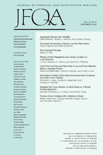
JOURNAL OF FINANCIAL AND QUANTITATIVE ANALYSIS
Illuminating Critical Issues in Financial AnalysisJOURNAL OF FINANCIAL AND QUANTITATIVE ANALYSIS, published by Cambridge University Press, is a premier peer-reviewed journal that has been at the forefront of the finance and economics fields since its inception in 1966. With a notable impact factor reflecting its Q1 status in Accounting, Economics and Econometrics, and Finance for 2023, the journal is recognized for its substantial contributions to both theoretical and empirical research. Researchers and practitioners alike benefit from its comprehensive scope, addressing critical issues in financial analysis and quantitative methods. Although the journal does not currently offer open access, it remains widely accessible through institutional subscriptions. The editorial team is committed to fostering rigorous academic discussions that shape the future of finance and economics, making it an essential resource for academics, students, and industry professionals seeking to deepen their understanding of these vital disciplines. For more than five decades, this journal has continued to be an indispensable platform for disseminating influential research, thus solidifying its role as an essential cornerstone in the financial and quantitative analysis community.

Review of Pacific Basin Financial Markets and Policies
Charting the Future of Pacific Basin FinanceThe Review of Pacific Basin Financial Markets and Policies is a prominent academic journal dedicated to exploring the dynamic landscape of financial markets and policies within the Pacific Basin region. Published by World Scientific Publishing Co. Pte Ltd and based in Singapore, this journal serves as a vital platform for researchers, professionals, and students interested in the intricacies of finance and economics. With an ISSN of 0219-0915 and E-ISSN 1793-6705, it encompasses a broad scope addressing critical issues and emerging trends from 2003 to 2024. Despite its current positioning within the Q4 quartile for both Economics and Econometrics as well as Finance, the journal fosters invaluable contributions that encourage scholarly communication and innovation. Access to the journal is through various academic libraries and institutions, providing an essential resource for those seeking to enhance their understanding of the financial frameworks in the Pacific region.
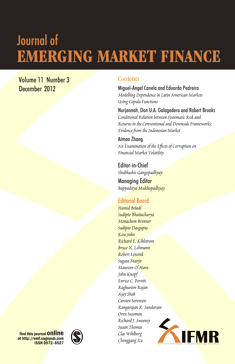
Journal of Emerging Market Finance
Navigating the Complexities of Financial SystemsThe Journal of Emerging Market Finance, published by SAGE Publications India Pvt Ltd, is a premier academic journal that serves as a vital resource for researchers, professionals, and students in the fields of finance and economics. Established in 2002, this journal focuses on the multifaceted dynamics of emerging market economies and their financial systems. With an ISSN of 0972-6527 and an E-ISSN of 0973-0710, it has garnered attention with its respectable Q3 rankings in both the Economics and Econometrics and Finance categories, reflecting its commitment to high-quality research. Despite its limited open-access options, the journal remains a significant platform for scholarly discussions, providing insights on emerging financial instruments, market behaviors, and economic policies in developing economies. As a continuously evolving publication, it aims to bridge the gap between theory and practice, promoting an understanding of the complexities faced in these vibrant markets, ultimately serving the academic community with relevant and impactful research until 2024 and beyond.
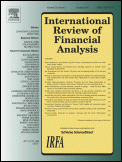
International Review of Financial Analysis
Elevating discourse with cutting-edge financial insights.The International Review of Financial Analysis, published by Elsevier Science Inc, is a premier journal dedicated to advancing the fields of finance and economics. With an impressive impact factor and ranked in the top quartile (Q1) of both Economics and Econometrics and Finance categories, this journal is recognized for its high-quality research and significant contributions to the discipline. Since its inception in 1992, it has provided a platform for scholars to present innovative theories and empirical studies that address critical financial issues around the globe, making it a vital resource for researchers, professionals, and students alike. Although it does not offer open access, the journal actively engages with contemporary debates in financial analysis, ultimately empowering its readership to contribute to and benefit from the ongoing discourse. With its convergence of financial research and analytical methodologies through 2024, the International Review of Financial Analysis remains a cornerstone in the pursuit of knowledge within the ever-evolving landscape of finance.
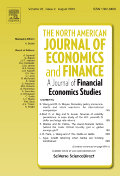
North American Journal of Economics and Finance
Uncovering insights in finance and economics.The North American Journal of Economics and Finance is a premier academic journal published by Elsevier Science Inc. since 1992, dedicated to advancing the field of economics and finance through rigorous research and scholarship. With an impressive impact factor and recognition in the Q2 category for Economics and Econometrics and Q1 for Finance as of 2023, this journal holds a significant position in the academic community, ranked #41 out of 317 in Finance and #100 out of 716 in Economics. The journal features high-quality, peer-reviewed articles that cover a broad range of topics, from theoretical frameworks to empirical analyses and practical applications. Though not an open-access platform, the journal provides valuable insights for researchers, practitioners, and students alike, promoting knowledge dissemination in the dynamic landscape of economic and financial studies. With its commitment to excellence, the North American Journal of Economics and Finance serves as an essential resource for those seeking to deepen their understanding of contemporary issues in these critical fields.

International Review of Finance
Advancing financial knowledge through rigorous research.International Review of Finance is a prestigious academic journal published by Wiley, located in the United Kingdom. With its ISSN 1369-412X and E-ISSN 1468-2443, this journal serves as an essential platform for researchers and practitioners in the fields of Economics and Finance. Ranked in the Q2 quartile for both Economics and Econometrics and Finance as of 2023, it showcases high-quality research that contributes significantly to theoretical and practical advancements. Reflecting its standing, the journal is positioned in the 61st percentile in Economics and Econometrics and the 60th percentile in Finance according to Scopus rankings. The scope of the journal includes a diverse range of topics, encouraging innovative discourse across various financial disciplines. Although it does not offer open access, the International Review of Finance continues to be an important resource for academics, professionals, and students seeking to deepen their understanding of evolving financial theories and practices.
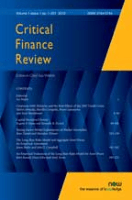
Critical Finance Review
Unveiling the intricacies of financial systems with scholarly precision.Critical Finance Review is a premier academic journal dedicated to advancing the field of finance through the publication of high-quality research that spans various dimensions of the discipline. Published by NOW PUBLISHERS INC, this journal has quickly established itself as a leading source of innovative finance scholarship, achieving a notable Q1 classification in the 2023 finance category. Operating under a rigorous peer-review process, the journal ensures the academic integrity and relevance of its content, which attracts contributions from both emerging and established scholars. With an ISSN of 2164-5744 and E-ISSN 2164-5760, it is accessible to a global audience, though it operates under traditional access models. The journal welcomes a diverse range of topics including, but not limited to, risk management, financial markets, and quantitative finance, making it an essential resource for researchers, professionals, and students who are keen to explore the complexities of financial systems and develop new insights in the ever-evolving landscape of finance. Based in the United States, Critical Finance Review holds a significant position within the academic community, fostering a collaborative environment that encourages innovative thinking and practical applications of financial theories.